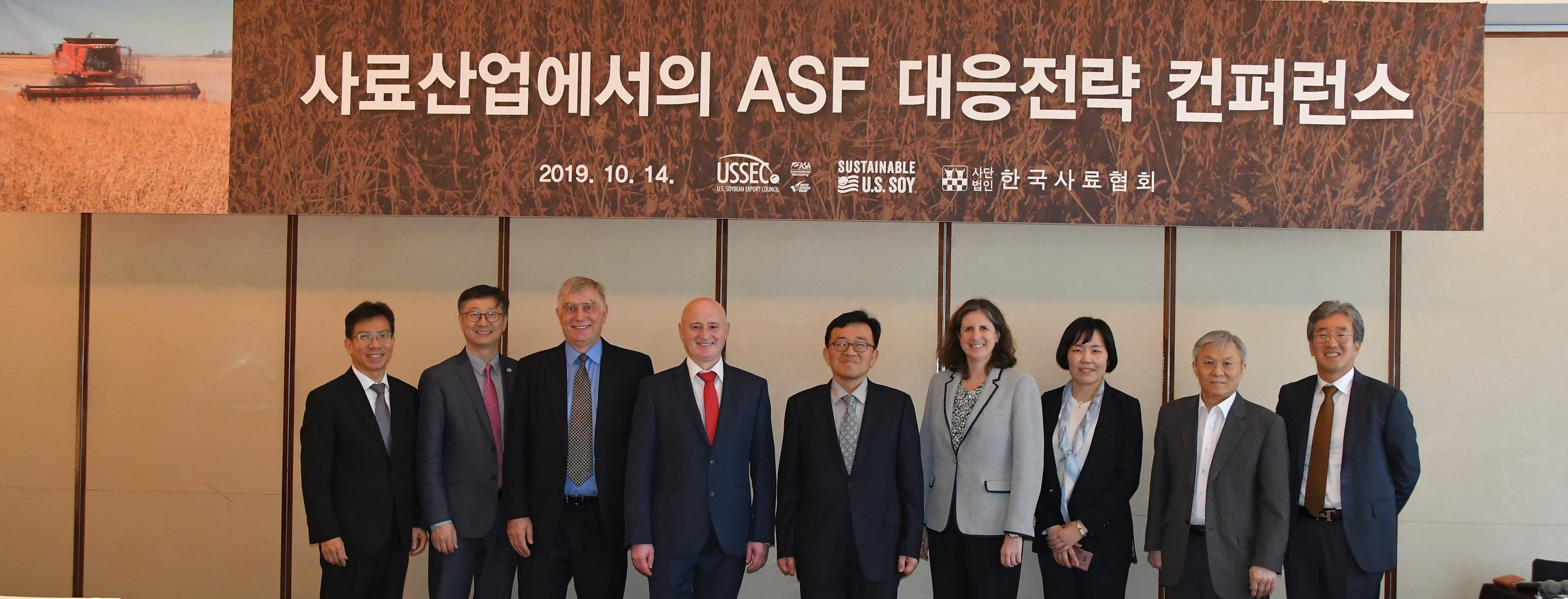South Korean Customers Increase Knowledge about Sustainable, High Quality U.S. Soy
- Category:
- Animal Utilization
- General News

USSEC organized a WebEx seminar in Seoul, South Korea on October 14, which aimed to increase Korean customers’ awareness on the quality and sustainability of U.S. Soy.
The main goal of the activity was to educate customers on U.S. Soy’s positive attributes and sustainability. As part of the technical support offered to U.S. soy customers from North Asian markets, a special focus was dedicated during the events in Seoul to the recent transboundary swine disease outbreaks around the world, mainly African swine fever (ASF). The presentations helped the Korean feed industry to understand how feed manufacturers and ingredient suppliers from several European countries fight and overcome the challenges raised by ongoing ASF outbreaks and get the latest updates on Feed Mill Biosecurity Protocols to ensure feed safety and integrity.

The conference, originally planned as an onsite event, was held as a WebEx because of the recent ASF outbreak in South Korea. Although the conference was held online, participation was excellent, with approximately 120 participants who are highly interested in the ASF situation in China and Europe. Attendees hailed from different fields: traders, importers, crushers, purchasing managers, and feed mill managers from independent and integrated feed companies. All are U.S. soy customers from South Korea.
During her conference opening speech, USSEC Senior Director – Market Access and Regional Director – North Asia Rosalind Leeck reiterated that besides the best quality and sustainable protein ingredient, the U.S. soy industry provides customers with superior service after the sale, a supply system second to none, and continued access to cutting-edge soy products. U.S. soy farmers are fully committed in ensuring the North Asian customers that every link in the U.S. soy value chain continues to operate in a sustainable manner consistent with sound environmental objectives, is socially responsible, promotes economic growth, and embraces best agricultural practices.

The unfortunate event of African swine fever that occurred a few weeks ago in South Korea created great concern for the livestock, feed, and ingredients supply industries, and so participants listened with high interest to the presentation on Feed Industry Biosecurity introduced by Dr. Chihaia. The presentation focused on increasing awareness on pathogen control among vertically integrated industries, starting with ingredients origination, through delivery of the feed compound to animal farms.
“The recent spread of the virus in South Korea constitutes a serious threat to the country’s swine and feed industry,” stated Dr. Chihaia. “The immediate actions - since the first case was reported - the state authorities took at the national level to stop the spread of the virus towards the south of the country were impressive: rapid action, deployment of army and civilian hunters to eliminate the infected wild boars.
“However, there is still a need to significantly raise the level of awareness on African swine fever risks among supply chain partners. This is particularly important for the feed industry because of its specificity. Priority actions are needed to address the situation and must be defined in a collaborative manner, rapid action being key for the control of this disease. The lesson learnt from the recent experience in combating the spread of the ASF in several European countries should be implemented by the South Korean feed industry in order to stop the spread of such disease. Especially because we do not have a vaccine, coordination, collaboration, and experience sharing between all stakeholders are essential, at a national level but also between the partners in the supply chain,” Dr. Chihaia concluded.
The presentation on the current trade situation between China and the U.S. and ASF’s impact on feed ingredient demand was also received with high interest. Dr. Zhang commented on current market context, how soybean consumption and pork supply is impacted by ASF outbreaks in China, and the efforts of the domestic swine industry to recover from the situation.
Mr. Clark discussed understanding, capturing, and incorporating the value of U.S. soy quality into feed with a state-of-the-art software tool, which will eventually lead to improvement of customers’ behavior and an increase in market share.


Korean feed production is approximately 20 million tons per year, making it one of the largest markets for U.S. Soy in Asia. Livestock production is predicted to continue to grow in South Korea, thanks to the rapid increase in meat consumption.


The day following the conference was dedicated to a press interview, where the team of consultants was discussed with a crew of journalists from key agricultural and livestock journals from South Korea: Ms. Ann Hee Kyoung (AFL News), Ms. Park Jun Ha (The Farmers Newspaper), and Mr. Jeong Hee Han (The Livestock Economic News).
Based on the positive feedback from customers, it should be concluded that being a customer of U.S. Soy is not only about using a quality protein ingredient to get optimum performances in animals, but that it’s also about the technical support offered by USSEC through different activities with the goal to build loyalty among South Korean customers.